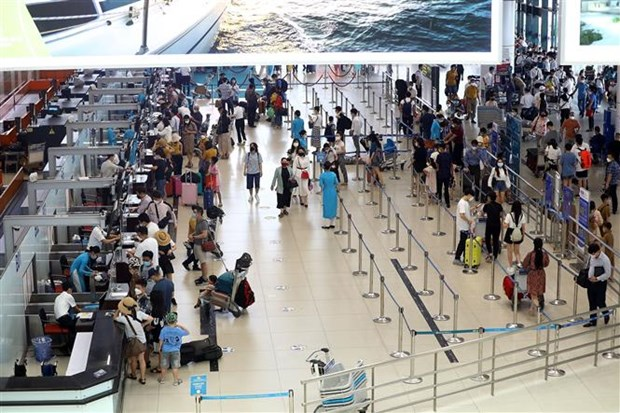 |
| Passenger at Terminal T1, Nội Bài Airport. — VNA/VNS Photo Huy Hùng |
The Ministry of Public Security has issued a warning for tourists to remain vigilant against travel scams that promise unbeatable deals. As demand for travel increases, criminals have taken advantage of the situation to defraud unsuspecting individuals of their hard-earned money.
In recent times, the MPS has received numerous complaints of fraudulent activities aimed at taking advantage of people's property.
Common tactics perpetrators use include advertising cut-price tour packages and hotel rooms on social media and other internet platforms.
Victims are then requested to transfer a deposit, ranging from 30-50 per cent of the total value, to secure the deal. However, these deposits are then stolen, leaving tourists with no reservations and financial losses.
Other tactics include advertising visa services for foreign travel, promising a high success rate and a full refund if the visa is not granted. After victims transfer payment for the service or a portion of the fee, the criminals will let the victim fill out the necessary paperwork and then claim that the victim's information is incomplete or inaccurate, refusing to return the money.
In addition, criminals also create fake websites or fan pages of reputable travel companies, forge payment receipts and bills, and ask victims to transfer payment for their tours. After receiving payment, they will cut off all communication and erase any evidence of their fraud.
These criminals also create or take over social media accounts and contact the victim's friends and family to claim they are stranded abroad and need immediate financial assistance.
The criminals can use Deepfake (an artificial intelligence technology to create video clips with images and faces of characters that resemble the image of the person the targets want to impersonate) and make faux video calls to make the victim believe they are talking to their loved ones and that the need for a loan is real, thus transferring money to the targets.
The criminals also impersonate airline ticket agents, create their websites and social media pages with addresses and designs similar to those of official channels or agencies, and then advertise with very attractive prices compared to the general level to attract customers.
If customers contact them, the criminals will book airline tickets, send reservation codes to create trust and ask customers to pay. After receiving payment, the criminals do not issue airline tickets and cut off contact.
Because the reservation codes have not been issued to airline tickets, they will be automatically cancelled after some time. Customers will only know about this when they arrive at the airport.
To avoid falling for the above-mentioned tricks, the Ministry of Public Security advises people carefully research information when choosing travel packages and only make bookings through reputable companies.
To be more assured, people can request to see the business operation licence, papers, and professional certificates of travel companies.
People also need to be vigilant when receiving invitations to purchase travel packages at prices that are too low (30-50 per cent lower than the general market price), especially when the travel company requires a deposit to hold a reservation.
If possible, it is best to make payment transactions directly.
The MPS advised tourists to pay attention to signs that can identify fake websites through their names and domains. Typically, the names of fake websites will be similar to those of real websites but with some additional or missing characters. Fake domains often use unusual domain extensions.
According to the MPS, for social media pages that promote and sell travel packages, especially cheap travel packages and airline tickets, people should contact verified pages (blue tick mark) or choose reputable social media pages that they know about the seller.
They should confirm booking information for rooms and airline tickets to promptly detect signs of fraud and report to the nearest police agency for guidance on resolution. — VNS